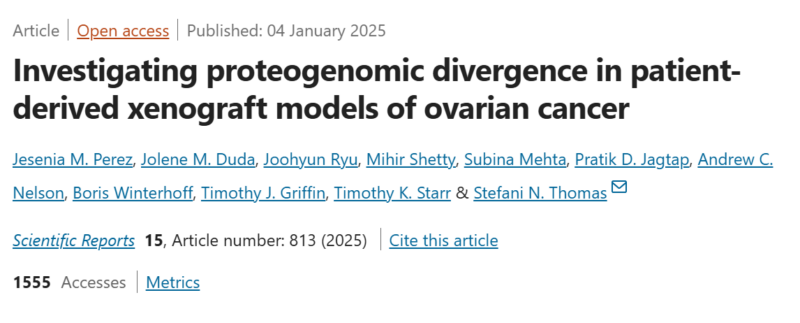
Susanna Fletcher Greer: The V Foundation grantee Stefani Thomas and her team explored PDX models in ovarian cancer
Susanna Fletcher Greer, Chief Scientific Officer at The V Foundation for Cancer Research and Leading Scientific Strategist and Cancer Researcher and Communicator, shared a post on LinkedIn:
“For ovarian cancer, a disease known for being tough to treat, different model systems have proven important to uncover how and why some tumors resist treatment. This week I am sharing an the V Foundation funded study that highlights exciting opportunities at the intersection of research and patient impact, and in how we develop and use different models.
Our researcher is bringing a fresh perspective to solving ovarian cancer.
When it comes to fighting ovarian cancer, we are constantly searching for better ways to test different treatments that could save lives. One powerful tool that researchers rely on is called a patient-derived xenograft (PDX) model – a technique where a small piece of a patient’s tumor is implanted into mice.
These models are invaluable because they can mimic how a patient’s tumor behaves, helping researchers understand how cancer grows and responds to new drugs.
The V Foundation has supported a wide range of research using PDX models because they hold incredible promise. These models allow researchers to study tumors in a living system, capturing their complexity in a way that lab-grown cells can’t match. For ovarian cancer, a disease known for being tough to treat, PDX models have proven important to uncover how and why some tumors resist treatment.
The V Foundation grantee Dr. Stefani Thomas and team Masonic Cancer Center, University of Minnesota explored PDX models in ovarian cancer with a fresh perspective in a new study by combining more traditional methods with cutting-edge “proteogenomics.” Their approach looked not only at the tumor’s genetic blueprint (DNA and RNA) but also at the proteins that drive cancer growth.
Why does that matter? Because proteins are the key players that make things happen inside cells. Understanding them gives us a clearer picture of how cancer behaves.
One major observation from this study is that PDX models are more dynamic than we thought, meaning they evolve over time. As the tumor is ‘passed’ from one mouse to the next, some biological processes, like the tumor’s interaction with the immune system, change. While this sounds like a challenge, it actually opens new doors for researchers to fine-tune how PDX models are used to test treatments in ways that closely mimic human biology.
This study highlights exciting opportunities at the intersection of research and patient impact, and in how we develop and use PDX models:
The first is better drug testing. By using advanced methods like proteogenomics, researchers can track how cancer changes over time in PDX models, making it easier to identify the best therapies for patients.
The second is in personalized medicine: Dr. Thomas’ research shows that using patient-specific data can make PDX models more accurate. This means future treatments can be tailored more precisely to each individual’s cancer.
Finally, we can have a deeper understanding of cancer biology. By analyzing how PDX models evolve, we are learning more about the “weak spots” in tumors. Information that one day can lead to more effective and targeted therapies.
No model is perfect, but PDX models remain a promising way to study the complexity of ovarian cancer in a living system. This study doesn’t diminish their value; instead, it gives us a clearer view of how to make these models even better.
Thanks to Dr. Thomas and team for pushing these discoveries forward- every cancer patient deserves hope, and every breakthrough brings us closer to a cure.
Find the Thomas lab Stefani Thomas | Medical School and read this insightful paper at Investigating proteogenomic divergence in patient-derived xenograft models of ovarian cancer | Scientific Reports.”
Investigating proteogenomic divergence in patient-derived xenograft models of ovarian cancer
Authors: Jesenia M. Perez, Stefani N. Thomas et al.

Ovarian Cancer: Symptoms, Causes, Stages, Diagnosis and Treatment
-
Challenging the Status Quo in Colorectal Cancer 2024
December 6-8, 2024
-
ESMO 2024 Congress
September 13-17, 2024
-
ASCO Annual Meeting
May 30 - June 4, 2024
-
Yvonne Award 2024
May 31, 2024
-
OncoThon 2024, Online
Feb. 15, 2024
-
Global Summit on War & Cancer 2023, Online
Dec. 14-16, 2023
